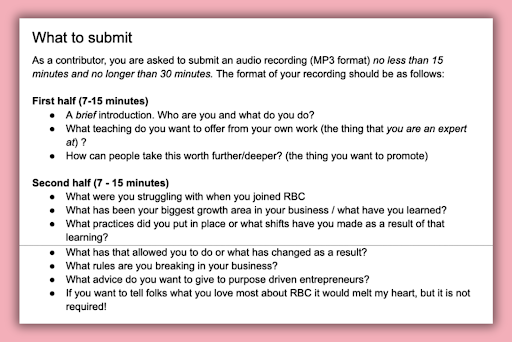[ad_1]
When I first started my podcast back in 2019, I didn’t plan on it becoming a marketing channel. I had recently quit my job to start my own operations consulting business and was listening to entrepreneurial podcasts trying to learn more. Most of them, though, felt like the curated version of a business owner’s story years later, and I was craving someone to share their experience while they were in the thick of it. I decided I could be that person, and I dove in.
Those early episodes were the messiest, most disorganized version of a podcast you could imagine. In the first one—literally titled “Winging It”—I discussed how I had no idea what I was doing but was going to do it anyway. I shared it on my personal Facebook page and with my 200 business Instagram followers. While I wasn’t tracking analytics then, I’d be shocked if even five people listened.
But I kept at it, and I slowly started to build a small audience. Eventually, people who had been listening to the podcast and hearing my journey started reaching out asking if I’d coach them through the transition to meaningful, full-time self employment. This wasn’t something I offered at the time, but when the pandemic hit and most of my consulting work dried up, I decided to give it a try.
Since then, I’ve grown my coaching business to a sustainable $85,000 of annual income, with about 90 percent of my clients listening to the podcast first to determine that I’m a good fit for them. And this is all with a baby audience of about 1,000 downloads a month. Energetically podcasting is fun for me, and it’s made sales relatively easy and sustainable: People who find my work have a place where they can dive into what I offer, and then they reach out ready to work with me rather than having to go through a whole sales process.
I’ve gone through a lot of experimentation and evolution in my podcast over the years and have landed on a streamlined approach that creates steady business growth. For any other business owner thinking about using podcasting as a marketing tactic, here is the process that has worked for me.
I plan content with my sales goals in mind
I don’t want to be a professional podcaster. And, frankly, monetizing my podcast is not a reality for me right now—if I tried to make money on ads based on my current audience size, I’d make about $5 an episode.
So, to ensure my podcast supports my real business and generates new clients, I do the bulk of my content planning with sales goals in mind. Once a quarter, I look at the programs I’m launching or services I want to promote in the coming months. Then, I think about the people who would be perfect for those offerings: Not customer avatars, but actual people in my audience who I’ve worked with in the past or have DMed with and think would benefit from this.
With a few real people in mind, I ask myself: What problems are they experiencing right now that this offering would help with? What do they think they need to do to solve that problem, and why is it not getting them the results they’re looking for? How is working with me going to more effectively help them? What do they need to hear from me to be excited to work together in solving this issue (or at least put them on a better track even if they don’t work with me)?
This line of questioning typically results in a four to eight-episode arc that leads up to a more direct sale. Here’s a typical structure that might follow:
- Episode one: I walk listeners through the way people typically approach this challenge, and why it’s not working. For instance, in episode 151, I break down a common problem (hating marketing), how people usually try to solve it, and what I think the real problem is (misaligned offers).
- Episode two: I explain the mental shifts that need to happen to tackle this problem in a more effective way. In episode 152, I talk about shifting your mindset away from “nobody can afford to pay me” to understanding the real problem, which is an unclear value prop.
- Episode three (or more): I dive into the actionable steps someone can do to make progress toward moving past this challenge. Episodes 153, 154, and 155 all give practical advice for getting started on understanding your value and getting that across in your marketing.
- Final episode: I share more about my offering, including how it will help the listener achieve everything above, the details of the product, and an explanation of why I set it up that way: I do this in episode 156 for a new offering I was launching around building an aligned business. Sometimes this is a paid service; other times it’s a free training to further nurture potential customers.
Not only does this system give me a clear and organized approach to content planning, it perfectly queues up a listener to want to work with me since my offering will support them through the exact steps I’m suggesting to move their business forward.
I mix “selling” periods with “growth” periods
I try to balance the phases where I’m focused on selling via my podcast with phases where I’m focused on getting in front of new audiences. And the best way I’ve found to do that is by mixing in interview episodes with other experts in launching and growing a business.
I always look for people to interview who it would be mutually beneficial for us to cross audiences—without it being competitive. Folks who are tangentially related to what I do are great candidates. For example, I recently released an episode with an SEO expert. There’s no reason she wouldn’t want people to buy my services, since my coaching around messaging, audience, and goals is going to set them up to be more strategic in their SEO targeting. And I would love for my audience to take one of my courses and then go hire her to accelerate their growth in that area.
I typically source my interview guests through networking and relationship building. Once they agree they’re interested, I send them a form to fill out to book their interview, which helps me stay organized when it comes time to record the introduction, compile show notes, and come up with three to five guiding questions that will touch on their expertise and goals while also providing value to my audience.
I let my clients do some of the talking for me
One of my favorite podcast tactics has helped me get in front of new audiences, promote sales, and reduce my workload. Once a year, I do a month-long takeover series where I let my clients take over the platform and record episodes themselves, giving them a platform for talking about their work while also putting out some social proof of the work I do.
I offer this opportunity to my group coaching program and have them apply with a short description of what they’d want to cover in the episode. If they’re accepted, I send along a structure to follow when recording and additional tips for making their episode as strong as possible. The first half of the episode, I encourage them to promote their own work and expertise, and then in the second half I have them talk about the work they’ve done with me and their biggest learnings from the process.

It’s such a win-win: My clients are so excited about the opportunity to speak and therefore are excited to share the episode with their networks. I always get a good spike in listeners after this series and have had people tell me the reason they started working with me is because they heard the testimonial from one of my clients in these episodes.
But even if it did nothing for my business, I’d keep doing it, because I want the people in my audience to succeed. I believe so much in every single person that I work with, and I love being able to give them this boost. When they do well, I do well.
I learn as I go, and evolve as my business does
It may seem like I have it all figured out now, but the podcast has evolved so much over time, and it is likely to keep evolving. It’s been a process of slowly figuring out what works and what doesn’t and letting things change as my business does. In fact, I’m getting ready to end Transcend Your Dichotomy and start a new podcast called Make Your Business Work For You. This new podcast has different goals—I’m looking for reach rather than sales in the beginning—so my approach will change a bit.
When these changes happen, I always leave my old content up so that potential customers can see that progression and know that I walk the talk when it comes to my philosophy of not overthinking things, starting messy, and learning along the way. I believe it’s that authenticity that makes them want to work with me even more.
So, if you’ve been considering starting a podcast for your business, stop overthinking it and just dive in. Perhaps try some of the strategies above, or maybe try some of your own. Either way, pay attention to what your audience is excited about and what you’re energized by, and keep evolving from there.
[ad_2]
Source link


